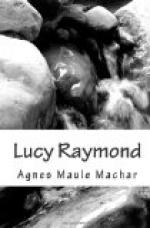Sophy, who had been a little fagged and worn out by her incessant round of gaiety, previous to her going to the seaside, was now looking more brilliantly handsome, Lucy thought, than she had ever seen her. Stella had informed her that Sophy’s betrothed had been at the seaside with them. “And oh, he’s so delightful, you can’t think! So handsome, and good-natured, and obliging! I can tell you, Sophy looked proud of him there! He gave her the loveliest emerald set; you’ll see her wear them. And I’m pretty sure they’re to be married next spring, though she won’t tell me; but I’ll coax it out of Ada.”
Lucy thought Sophy must be very happy; yet she could not help thinking if both she and her lover were really Christians, how much happier they would be! Nothing Stella had said led her to suppose that he was; and if he were, what an alloy of anxiety and separation in the most important points would mar the perfection of love!
It was with increased zest, and a fuller appreciation of the interest and value of her studies, that Lucy entered upon them once more. The happy weeks at Oakvale had been of permanent benefit to her, in opening new channels of thought and enlarging her sphere of mental vision, both through the books she had been reading, and the comments of Dr. and Mrs. Eastwood, both of whom had thoughtful, cultivated minds. She now studied with very little reference to prizes, or even the approbation of masters, but from a deep interest in the studies themselves, and a feeling of their beneficial effect in leading her to higher ranges of thought. Every new attainment was but a step to a fresh starting-point in the never-ending pursuit of knowledge; and Longfellow’s beautiful lines often recurred to her mind,—
“The lofty pyramids
of stone,
That, wedge-like,
cleave the desert airs,
When nearer seen and better
known,
Are but gigantic
flights of stairs.”
Then the feeling grew to be more and more strong with her, that every new acquisition—every step in mental discipline which God had given her the opportunity of making—was a talent to be held in trust and used in His service. Mrs. Eastwood had explained that, though we may often have to study during the years of school life without seeing what special use we may be called to make of our acquisitions, still God will undoubtedly find some use for whatever power we have gained while following the leading of His providence. “Therefore,” she would say, “the doubt whether such and such a thing will ever be of any use to us is no excuse for sloth in acquiring it, when it is clearly our duty to do so.”
Her studies were rendered doubly interesting by the companionship of Mary Eastwood, who was animated by the same spirit, and in whose friendship she found her greatest pleasure during the winter. Stella was rather surprised at the affectionate greeting between her cousin and Miss Eastwood the first day they met at school, for she had scarcely given Lucy an opportunity of telling her more than that they had met often at Oakvale.




